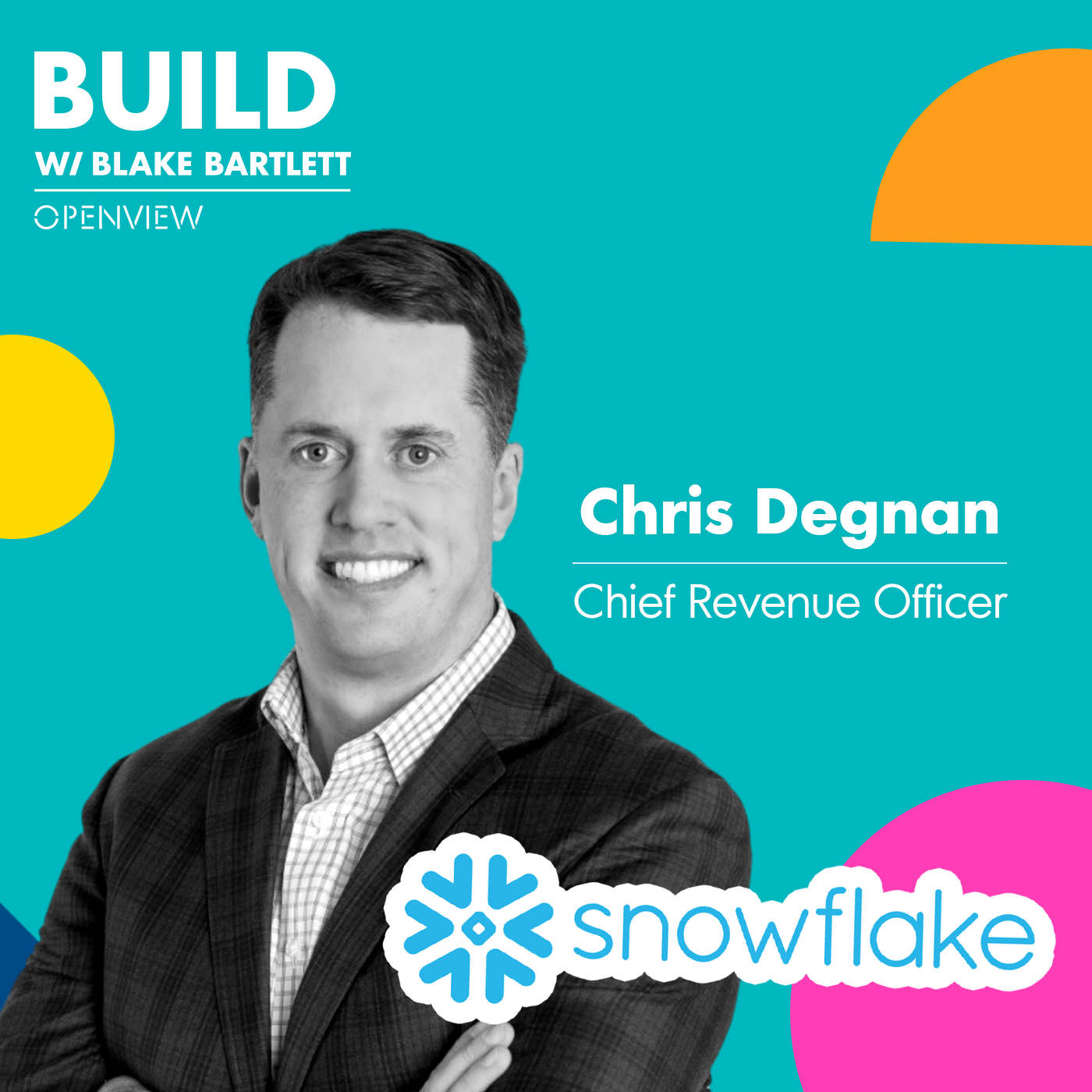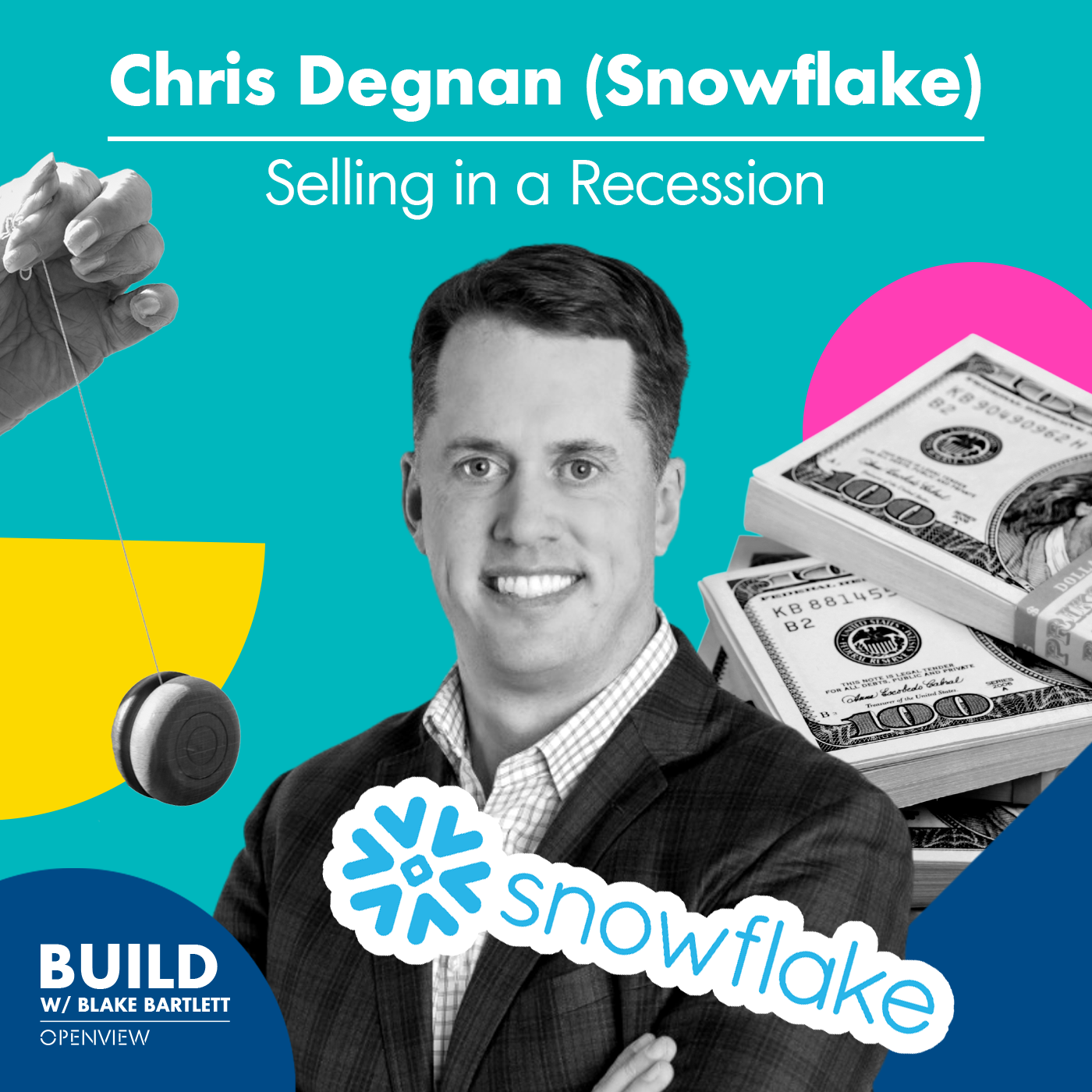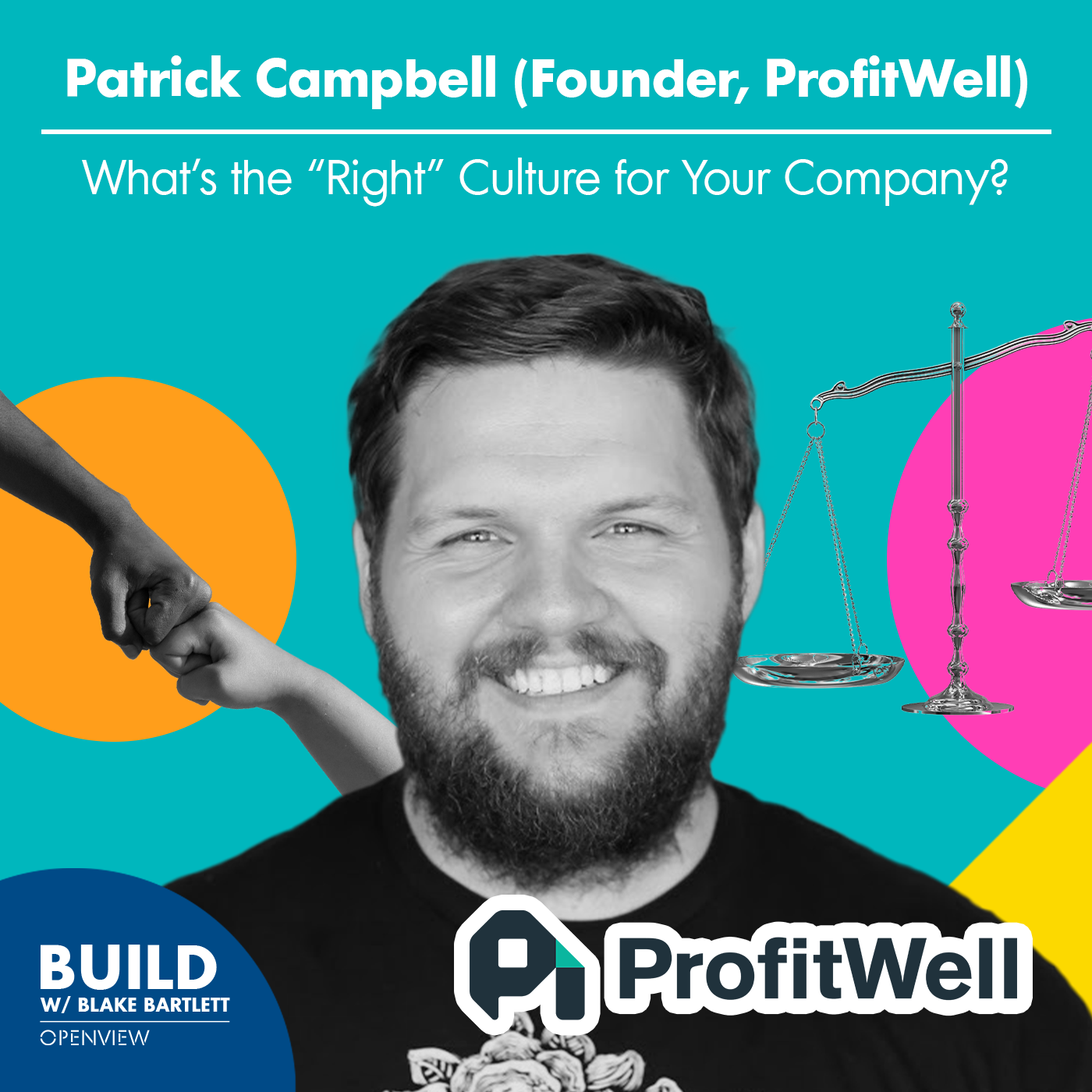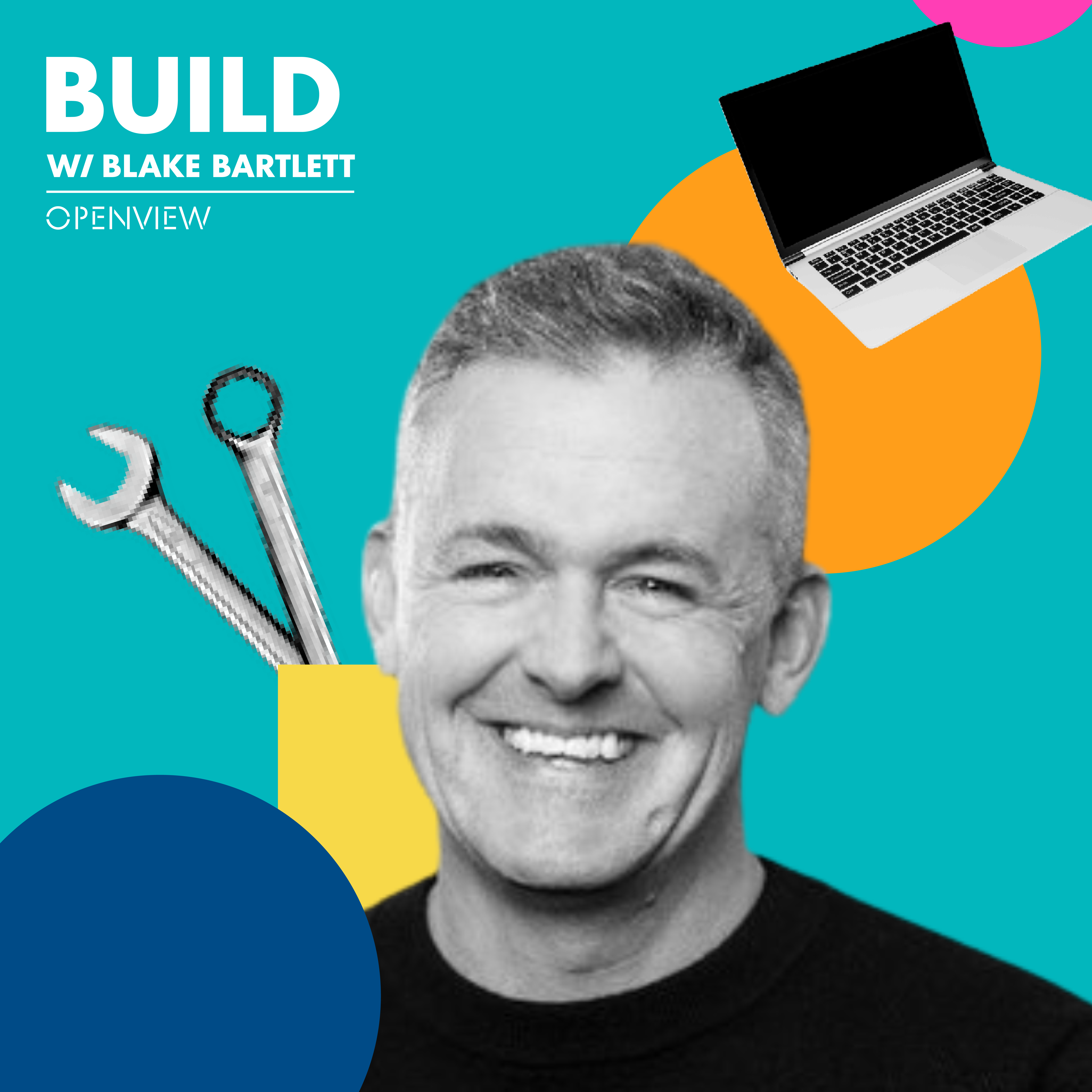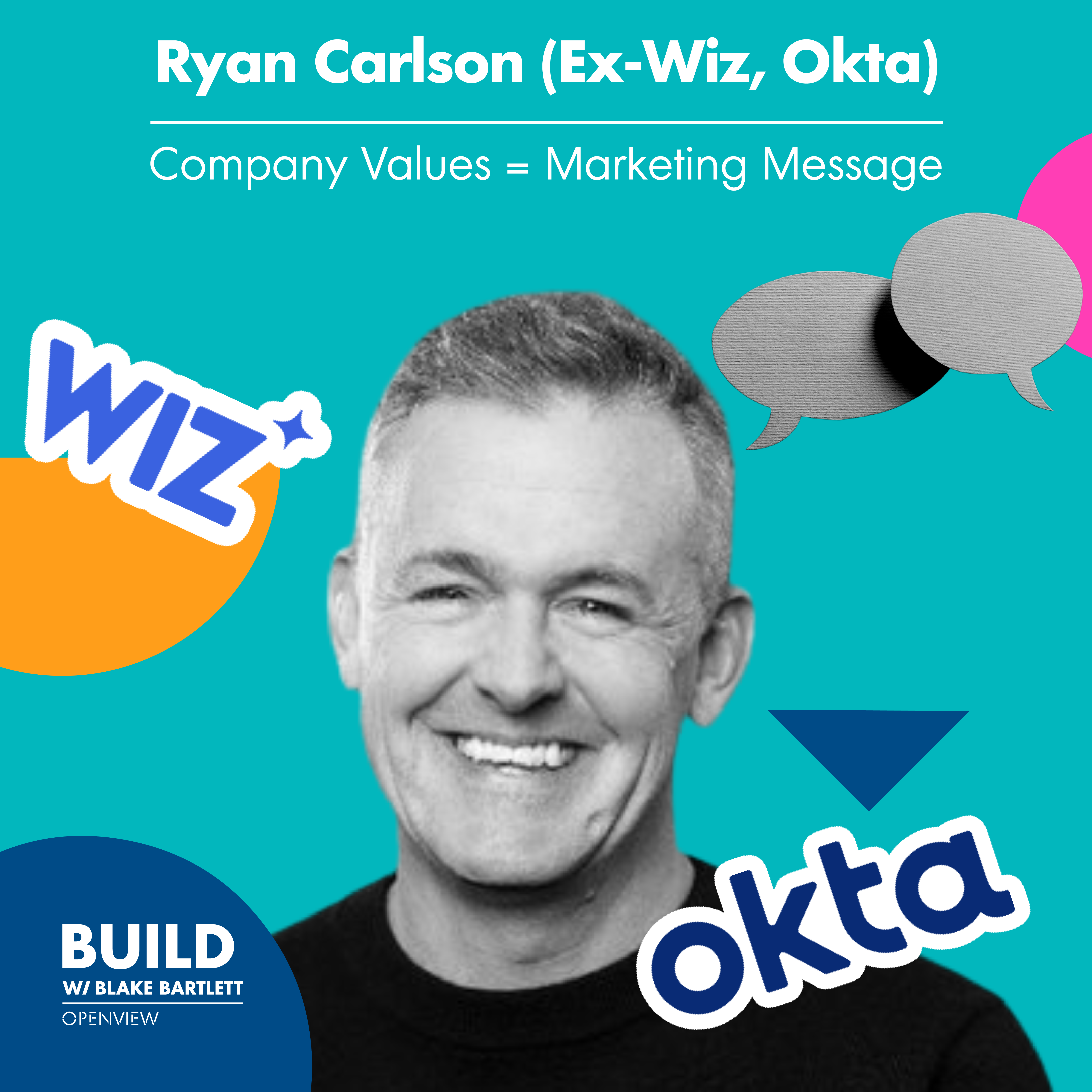Chris Degnan (Snowflake): Selling in a Recession
- 0.5
- 1
- 1.25
- 1.5
- 1.75
- 2
Blake Bartlett: Coming up on today's episode of BUILD.
Chris Degnan: We knew that they were in a tough time, and we were empathetic to their challenges. And that's going to happen in this economy. There's going to be people whose businesses are in trouble. While we want everyone to be successful, this is just the nature of business. And I think you have to be empathetic to that and listen and make the smart business decision not only just for your company, but for your customer. And if you become a customer advocate as well, and operate above board and do the right thing by the customer, generally speaking, that works pretty well.
Blake Bartlett: Everyone today is looking for advice on how to navigate a difficult economic environment. Funding has slowed, hiring is frozen, Budgets have been cut. So what do you do? This is especially true for sales folks. We've been in a decade long bull market for software, and 2020 and 2021 in particular was an absolute sales bonanza. The biggest challenge was being able to effectively meet all the demand that was falling from the sky. So when buyers slam on the brakes and the bull market is over, how do you adapt? How should sales reps approach their prospects and customers to continue hitting their number? And how should VPs of sales or CROs be leading their teams differently today? Our guest on today's episode of BUILD is Chris Degnan, and he hits these questions head on. Chris is the CRO at Snowflake, and he's been leading sales at the company for over nine years. Chris and I dive into these specific questions on how to sell in a down market, but what I realized during our conversation is that these are the best practices for top performing sales reps in all environments, not just a bear market. So if you're a sales rep or a sales leader looking to improve your game, regardless the economic environment, this is the episode for you. So let's dive right in with Chris Degnan. What is the mindset and action plan of a great sales rep in a recessionary environment? What should folks be focused on today?
Chris Degnan: I think Covid actually made us all think a lot differently on how we had to sell. Historically speaking, especially in field sales, you could take people out golfing and you could take them drinking or whatever, and then all of a sudden that went away during Covid, and it forced us to sell quite differently. And really that became a huge thing for us in enablement, in having our sellers really become students of what they sell. I think it's so important now to not just be a glad handing sales rep, high fiving, no, you actually have to provide value to your customers. I think time is so precious, and now we're competing, a lot of people are still working out of their houses and we're competing with time with their families. So on the other end of the spectrum, our customers, they have a job to do, they're not here to just do us favors. I think it's really important for a sales rep to understand that their time is precious. So things like making sure that you show up to a call with an agenda, making sure that you understand the pain, you've done research on the customer's pain, and I help them identify those pains. Because again, it goes back to the budgets are not very large right now, and people are needing to make sure that they're spending money wisely. And so I think that's a really huge thing for our sellers, is making sure that they add value to the customer, they're not wasting their time. They really understand what they're selling and who they're selling it to. So those are the things that I strongly encourage our sales team to do.
Blake Bartlett: What do you mean by being a student of what you sell? What does that look like in practice and in real life?
Chris Degnan: I'm not the type of salesperson that can go sell anything to anybody. I'm not that good. And I have to have passion and conviction around what I'm selling. And there's not always this easy thing to say, " It fits here." You have to be curious on the customer side. You have to be curious on the pains that they have and ask them as many questions as you can without wasting their time. On the side of what you're selling, in the example of Snowflake, it's really important for me to make sure that I understand where we fit and where we don't. When there's stuff where I don't want to go waste a customer's time, but I'll give you an example. I was just out in New York City a couple weeks ago meeting with a customer who's been a customer of ours for six years. And Snowflake's changed quite a bit over the past six years. As he was explaining to me how he uses a BI tool with Snowflake, it's because we didn't have a lot of the connectors and all this other stuff that he needed six years ago. So he's just kind of left it that way. And I'm like, " Dude, it's way easier now. It'll cost you less money and here's how you do it now." And I know that because I've been knee deep in Snowflake for nine years. So it's really, really important for my sales team, for me, for all sellers to really making sure that you're adding value, that you understand the technology or the product that you represent, otherwise you're just some glorified meeting organizer, that's not what you want to be.
Blake Bartlett: Yeah, and I think what comes through to me in that, that's a great example because a customer that's been with you for six years, it's really easy to assume that they're up to speed on everything that you're selling and everything that you have to offer and all the best ways to use your platform. But assuming in that case is both a disservice to the customer as well as to yourself, the seller. And so instead of assuming, being curious and saying, again, going back into, even for a customer that's been here for six years, " What are you doing today? What are the specific challenges today?" And being aware that, hey, maybe we didn't have a capability a few years ago when you signed up. We now have a capability. Are you using it? Are you using it to its full extent? Are you getting the full business value? There's always a next phase of what you can learn from a customer and the value that you can provide. So that's what's coming through to me, and that not assuming and instead clarifying, being curious, asking the follow up question, and really finding what's that kernel of pain and what's that kernel of opportunity.
Chris Degnan: And in this environment also showing them how they can save money. I mean, I think even if it's on your own platform and there's a better way that they can do it cheaper, faster, do you know what, you establish credibility by doing that. If you go in and say, " Hey, my product can run faster when you do it this way and you don't have to pay us any more money," well geez, they appreciate that. They'll give you opportunity to earn more business in the future for sure because you built this trusting relationship.
Blake Bartlett: And the other thing that I think is coming through in how you're talking about it, and I think this is always a good thing, but especially at a difficult macro environment, you do need to be curious and curious about the customer's pain, but are you settling for and stopping at more of a generic pain, or are you getting really, really specific? And I think going towards specific pain is where you find the specific opportunity for that specific account to get that specific budget that they may or may not want to send your way. It does remind me of listening to a couple of interviews that you'd done about the early days of Snowflake. So obviously very different environment, very different time of the company, but the specific pain that you were focused on is obviously there was existing vendors in the market. A lot of people were using Redshift. And so instead of just saying, " Hey, we're better than Redshift," it was, " Here's the three specific things that you're probably having pain with with Redshift, is that true or is that not true?" And really going down to those tactical level, getting into the weeds, getting into the details, and then selling against that pain, here's how we solve that specific pain. That's always valuable, but especially now because of the recessionary dynamics.
Chris Degnan: Yeah, the silly example is it's going to have a beer with your buddy at a bar and you kind of pony up to the bar and you have your first beer and you're saying, " How's life?" And they're saying, " Great." And then you actually have a second beer and you kind of say, " Well really, how's life?" And then all of a sudden they unload on you. When I walked into the market with Snowflake, Redshift had already been in the market for a year. We had no website, no customers to speak of. And so I would walk in and I would show a customer a demo and they'd say, " Wow, that's really cool," but really cool doesn't get you the next meeting. Really cool doesn't get them to try the technology. As I found out, because we'd walk out of a sales call and we'd be high fiving saying, " Yeah, they thought that was really cool and we got something." Well geez, you know what? Then they would ignore my emails or my phone calls. What I then had to hone in on is, okay, you have this semi- structured data that you put in one platform, you transform it and load it into your Redshift. Well, we can do that all inside of Snowflake a lot faster and cheaper. Let me show you how. Don't trust anything I say, let's do a small pilot on my dime and I'll save you time and money if you do this. And sure enough, in fact, I was just talking to one of our first sales reps last night, and that's really what we were talking about, is finding that single pain was around JSON. And who knew, that's what kept Snowflake alive for our first probably 100 customers for our probably first two years. And that's a meaningful thing. You need to find that real pain. Otherwise it's like, " Yeah, that sounds neat, but I have a lot of things to do in my day job. I'm not going to go do that." I think that's like today, I'm on the receiving end of a lot of sales calls, prospecting calls, and people are like, " Hey, do you have 15 minutes?" For what? What value are you going to provide me?
Blake Bartlett: And on that example of when you're on the call, the way I was hearing it is, you can approach a call, any kind of sales call, is it a performance or is it a conversation, right? A performance is like, okay, I got this song and dance, it's really well rehearsed, I got this awesome product, and then you go and do your 30 minute song and dance and you're like, " Don't you think that's cool?" And at the end of the call they're like, " Yeah," they give you a round of applause for your performance. And then you come away feeling like, okay, they loved it. And really what you're feeling is that went well for me. I did the performance well and they gave me praise afterwards. But you're completely not actually thinking about what's going on in their environment. So instead of doing the performance, you're having a conversation. You're not just giving your talking points, but you're understanding the customer's context, you're understanding their specific pain, and then you're giving them a specific delivery of here's what we do against that, as opposed to here's my generic performance. And that's really going to resonate with them versus just, " Hey, that was a cool demo, thanks for not wasting my time in that way."
Chris Degnan: It drives me nuts every time I go on a sales call and you have someone, you have a sales engineer, you have a sales rep, and all they care about is their presentation. And I'm like, " Dude, guess what? The customer, you get them talking the most and you make this a conversation, and if you're good, and it goes back to if you're a student of what you sell and you know the product and you know the solutions and the issues that we can solve, if they give you enough information, you should be able to cater your pitch to solving their problems." Otherwise, if you just get up there and vomit on them, you're just kind of spraying and praying. Especially now, don't waste people's time. People are nice, so when they're on their phones, they're on their Zoom, they're probably playing a game while you're doing your pitch.
Blake Bartlett: They're trying to get Wordle for today.
Chris Degnan: Right, right. Exactly.
Blake Bartlett: Yeah, no, I mean reflecting back on my early days in sales, I would rehearse the pitch, I would get it all down, and then the prospect, or in my case the founder would interrupt me and ask a question. It's like, wait a second, I was just getting going there. You're interrupting my flow. And it's like, okay, that's completely the wrong way to approach it. If you feel like somebody's interrupting your perfectly scripted performance, you're doing sales the wrong way, it's supposed to be conversational. So yeah, totally makes sense to me. Let's talk deeper about business value. What do you have to show? Obviously everybody knows, yeah, you got to make the business case, yeah, you got to prove ROI. But what does that look like in practice and what does that look like today in a more difficult economic environment?
Chris Degnan: Well, one of the things that I've noticed in just the evolution here at Snowflake is we start off as a cloud data warehouse. Now we're the data cloud. And what I find that's also about being the data cloud, being just the cloud data warehouse, is I was always just focused on selling on an ROI. We run our queries faster and cheaper than the next vendor. And that's a race to zero in that you're selling a commodity. I sold for eight years at EMC for data storage and it's like, it was the same thing and that's why I left. Now, what I spend a lot of my time doing is I talk to VPs of sales, I talk to CFOs, I talk to CEOs of Fortune 100 companies because what we're doing a better job of now is tying data to revenue and new revenue streams. So in analyzing business, in all sorts of stuff like that. Yes, the cost savings is important in this day and age, and sure you need to show that because you're going to have people in procurement that are going to hold you accountable to that. But on the flip side, if you can then find a way that you can tie yourself to revenue, especially in this economy, then geez, it's a way easy and better sale. If you can find revenue and associate your service product, whatever it is, to that revenue, you're differentiating yourself. Again, it goes back to what we started off, be a student to what you sell and then understand how to pivot in the conversation to then say, " Well geez, Snowflake has a data marketplace and customers have data. Have you ever thought about selling this data set?" " Well, no, I have not." " Well, we have all these people like hedge funds who buy data sets." And so that's a lot of times what I spend time talking to customers about and it's awesome.
Blake Bartlett: Yeah. That emphasis on revenue as being the most powerful business value driver is super key. And I'm kind of preaching this to anybody who will listen, any founder I work with, any founder that I connect with, is that there's a hierarchy of business value. Oftentimes it can be different for how does the customer think about that hierarchy of business value versus how does the rep or the company or the vendor think about that hierarchy? And so in the customer's mind, it looks like number one is revenue. Are you increasing revenue? Are you driving revenue for me? Are you increasing my sales? That's number one. Number two is are you actually driving cost savings, hard dollar ROI? Number three is time savings, and number four is personal preference. Do my folks love this product more than the alternative out there? That's how they think about it. Revenue, number one, cost, then time, then sort of personal preference. It's actually a lot of times the exact inverse for sellers. They're like, personal preference, people love my product more than the other vendor. It drives time savings, isn't that awesome? And time is money, so there's cost savings as well. And then they'll do some hand wavy thing about if you tie all this together, theoretically there could be revenue. And so they're not really thinking about the hierarchy of business value and proving it to that specific customer pain the way that the customer is. You're kind of mismatched in that regard. Realizing that and aligning with how the customer thinks to me is the key. Again in any business environment when you're trying to sell a much larger deal and fight for budget against all the other places to go, but especially in a downturn, especially in a tough market.
Chris Degnan: Yeah, I think we have a competitor at Snowflake who's obsessed with us. And what they do is they say, " Snowflake's really expensive," whether it's true or not, they just kind of make it up. And so a CFO is like, " Well geez, Snowflake's becoming one of my most expensive things on the list." And then they say, " Well, we're open source, Snowflake's not open source." So they kind of play those cards against us. And it's like, well yeah, but that goes down to personal preference. I'm fighting a religious war, open source, versus a not open source. And it's like, okay, you're going to go build something. And oh, by the way, if you're the CFO, you have some customized stuff. Well guess what happens when that person or that group of people leave, because they will leave, and sure enough you'll have some challenges ahead. So I think it goes down to, of course, if you can tie yourself to revenue, to be honest with you this is why I like doing this job now versus nine years ago. Snowflake's been super successful, it's been an awesome ride for me. I need something to get me up every day and get excited, otherwise I just wouldn't do it. And I think talking to people about driving business value, driving revenue for them is something that gets me excited. And again, I can play the cost game, I can play the personal preference game, because that's what my competitor wants to do and bring me down there. But really what I see is really around tying myself to revenue is so differentiated, and that's when the relationship changes with the customer.
Blake Bartlett: Just a quick break in today's conversation to make sure that you are getting all the latest in PLG content from OpenView. First things first, if you haven't subscribed to BUILD in your favorite podcast app, make sure you do that now. We drop four episodes per month and subscribing is the best way to stay in the loop. And while you're at it, drop us a rating and review for the show so that others can find it as well. And secondly, did you know that I'm a YouTuber? I put out weekly videos on the latest and greatest in PLG with my show called The PLG 123. Every video is two minutes or less and features VC perspectives from yours truly on the latest in VC, SaaS and of course product led growth. So find me on YouTube by searching Blake Bartlett and make sure to subscribe to my channel so that you don't miss a single video. Okay, now let's dive back into today's conversation. All right, shifting gears, that was a lot about in the moment, if you're a rep, you're working in account, how should you approach it? Let's shift to sales leadership. So how should sales leaders be thinking today? What should their mindset and action plan be during the recession? How should they be leading their teams?
Chris Degnan: One of the things that I'd say, not just in the recession, but one of the things that's been kind of a negative of all the hyped up valuations that we've seen over the past couple years is that you have startups that are getting large rounds of funding. So they're getting a series A round of funding and they're getting$ 100 million at a whatever, $ 500, $700 million valuation. On paper, that sounds awesome. What it doesn't teach you is how to actually do more with less. So my current CEO has this saying, which is kind of funny. He says, " Eat like an ant, poop like an elephant." And I think that's important for everyone, whether you're a series A company, whether you're a publicly traded company, you just don't blindly hire. You don't blindly just say, " I'm going to go put people in the geography just because that makes sense." You really do have to evaluate, do I have product market fit? Do I have the right customer base for this sales team to be successful? So one of the things that they talked about yesterday in this investor conference was constantly measuring productivity. So at Snowflake, I have a monthly analytics call every single month from both finance and my sales strategy and operations team where we talk about different things. So we talk about everything from how's a territory performing, to what's our top earners making, to how many reps are hitting quota, how's the productivity by division? Et cetera, et cetera. They're different topics each month, but they're repeated every quarter. When Snowflake was born, we had$ 7 million in seed funding or series A funding and we had 20 employees. We needed to be really a little bit desperate to be successful. I would say the same should apply as you get bigger, is that as valuations got bigger, we were a little bit more kind of freewheeling with the money. And it's like, no man, that's not how you should operate. I think you should always operate under the premise that you should always think, "You know what, tomorrow is not a given and who knows what's going to happen tomorrow, let's make sure that we live to fight another day." And so you evaluate from a sales leader perspective, you evaluate the performance of the team. And sometimes you have a sales rep that says they're going to use the macroeconomic environment in telling you that they can't be successful. And unfortunately that's not true, for them. There's going to be a lot of things that are going to affect your ability to be successful. But really if you get up every day, what do you got to go do? Well, if you're a sales manager, making sure that you have reps that are getting up, they're prospecting, they're doing the things that they have to do. So when I was at Snowflake, day one, I had no boss, and I'm sitting there saying, " Well geez, what am I going to go do? Well, I'm going to go on eight sales calls a week. I'm going to go make sure that I have three to four net new business meetings. I'm going to make sure that I send a weekly activity report to the entire company," which I did. And some of the engineers still have those emails. And by the way, that's how you should hold your team accountable if you're a sales leader in this environment, is if they're going on one to two sales calls a week, guess what? You're the wrong person in the job. Period, full stop. You cannot be successful if you're going on one to two sales calls a week, and you have to measure that. So if you are a sales leader and you're not holding your team accountable, you're not measuring them on a weekly basis, you'll fail. Entitlement or other things will come into play. They'll say, " Well, I'm not successful because," well you're not successful because you're not doing your job. And that's what it comes down to. You have to be ruthless about that. And that's the hard part about it, is we're all humans, we all have empathy, I hope. Being an empathetic leader, you can listen, you can understand, but you also know that, my CEO now says, " Look, do you think the board is my friend? They're not my friend. They've hired me to make money for shareholders." And that's how you have to view it. Is we can have friends, we can have friends at work, but at the end of the day we have to do our jobs. That's really what you as a sales leader, and that's what I expect of my sales leaders. And the second that I start to have to do their job for them is they're in the wrong job, they're in the wrong job. So that's what it comes down to. Early days of Snowflake, we had one sales rep down in Southern California, and I'd go down to have meetings with him. He's a super nice guy, and I would go down and have meetings with him and we'd have one meeting and we'd sit in a coffee shop for half the day. And I'm like, " What the hell am I doing here?" And then the guy who was his sales manager comes to me and says, " Hey, I'm going to put two more sales reps in SoCal." And I'm like, " Oh my gosh, this guy, do you think we have the territory to do that?" And he's like, " Yes." And sure enough, we put two guys in there and they did the job, they got up every day, they made the dials, they got in the first calls and they sold. And sure enough, this other guy was like, " Oh," some people don't want to hold themselves accountable or don't want to do the hard thing. I'd rather work at a company that is not going to give me free lunch every day and save money and have my stock worth more. A lot of people are like, " I want to work at a place that has slides and popsicles and balloons everywhere." And it's like, you know what? That's great, I'm in this to have fun, but really to make money. And that's what you have to kind of do. And again, it goes back to you are entitled to nothing. Nine years on this job, I'm entitled to nothing and I am owed nothing. I have to get up every single day and do my job. And if I'm not doing my job, I told my CEO, I told him this recently, I said, " If I'm not doing my job, you don't even have to fire me." You can just say, " Chris, maybe you should leave," and I'll leave on my own volition because that is how I feel. I own being successful in this job. I'm on a 90 day contract to keep my job every quarter. And that's how I view it.
Blake Bartlett: That's super key. So this is getting into the rep level again, we had team level, how should build leaders be thinking about that, and then at the rep level, what are the actions, what are the activities people should be doing? What should you be inspecting there? And pipeline generation is kind of what you're emphasizing there, and the importance of going on sales calls, and you have this magic number of eight sales calls per week. So maybe say a little bit more about that, and what does that look like in practice for an average rep?
Chris Degnan: Yeah, so again, I had been in either front or second line management prior to showing up to Snowflake, and it was just me, so there was nobody else. And so when I showed up, I'm like, what am I going to hold people accountable to? So I had an unrealistic expectation when I was at EMC that you'd go on 15 sales calls a week, and that's hard. It's possible, and I've done it even here at Snowflake, but it's hard. Because you also have to have discipline around prospecting. So if you're doing your own pipeline generation, which by the way, my view is every single sales rep owns their own pipeline generation, marketing, they're there to support you and that's a value add, but you're not entitled to that is my view. And so I think you have to basically be very disciplined. If you're going to say, " I'm going to go on eight face to face meetings a week, I'm going to go two to three net new business meetings a week," that's really what you want to do. Now some people are like, " Well geez, I don't have a territory that has enough new prospects to go have two to three net new business meetings." Well, you don't have to go have two to three net new business meetings in two to three net new companies. You can have two to three net new business meetings in your existing account base, to find new use cases, to establish new champions. Because as we know, things change quite rapidly. I'm sure we'll see layoffs in this economy, and we are starting to hear about them. And it's like, geez, you need to not just rely on one champion in an account, you need to spread your wings in that account, otherwise you're going to be in trouble when that champion gets laid off, or they take a new job or whatever. So I think the thing I go back to is have discipline in your week to figure out what are you going to need to do to get to the next week, and how are you going to have eight business meetings? Not like partner meetings, partner meetings don't count, customer facing meetings, how are you going to do that? And what are you going to do? What prospecting things do you have to do? Look through your lead list, look through your account list, get on LinkedIn, send people LinkedIn notes. These are all things that I did. I would go through Indeed, the job board, and look for people that were hiring Redshift engineers, and specifically target those people in a given city and say, " I understand you are using Redshift. Here's the problems that some of our customers have." Boom. And so that's how I attacked my kind of weekly cadence. And what I started to realize is as I started to not have time to do the prospecting, then I started to need more sellers. Because all of a sudden I was going on 10 meetings, 15 meetings a week, and I wasn't doing a good job setting myself up for the next week. And that's the same thing for a week, a month, a quarter, you can have a great Q4. Q4 is always magical, typically speaking, in a sales organization if you have a decent product. And the hardest part is getting people to focus on Q1 in Q4, and having the discipline. And candidly, there's territories in Snowflake that didn't do that last year that paid the price this year. And so I think you kind of have to say, " Okay, yeah, I'm going to have a big Q4, but I'm also going to then start looking at Q1." And so as a sales leader, I'm now measuring, I'm not only asking my sales leaders to give me a forecast for Q4, I'm asking them to give me a forecast for Q1. And I do that religiously every quarter so that I'm always asking people to look a quarter out. These are some of the things that I think in this day and age you need to always be worried about tomorrow. And if you're just saying, " Hey," high fiving yourself, saying, " I've got this big deal." Well what about your paycheck next month, next quarter, next year? You like making money, that's why you're in sales. Well then keep doing that. Keep doing what you're doing and don't forget that. And that's really important.
Blake Bartlett: Yeah. I mean, it does come back to just general, how do you be successful in life advice, which is take responsibility for your own actions and take responsibility for your own outcomes that you generate. And this kind of goes back to stuff you were talking about at the beginning of the conversation, which is especially now, it's really easy to blame others, blame the market, the macro, the recession, the budgets are getting cut, marketing isn't sending me enough MQLs, my SDR isn't sending me enough SQLs, those types of things. You can view it that way and say, " Here's all the reasons and everybody else that's creating my lack of success." Or you can say, " What am I going to do to drive my own success? Am I going on those eight new business meetings per week? Am I doing the things that are the inputs to get the desired outputs?"
Chris Degnan: Exactly. You should consider yourself, if you want to be successful in life, is yeah, it's great to be a part of a successful company. Frank's been part of three very successful companies. One of the things that he does, which I totally appreciate, is he makes fast decisions that are tough decisions, but he holds people accountable, which then raises everyone else's game. Every single day, whatever you're doing, just be the best you. And if you're not doing it, quit your job, go do another job because maybe you don't like it, but you're doing yourself a disservice by just being a passenger on a successful company.
Blake Bartlett: So rounding it out with advice for sales leaders. So down to the deal level, how should you be advising and leading reps as they're going through deal processes when say budgets might be smaller than they were before, budgets might be more uncertain than before, maybe you're getting a much smaller ACV than you historically have. Do you fire the prospect and wait for the budget to come around? Do you get creative in that moment? What do you do in the actual deal when the prospect is dealing with the uncertainty and the lower budgets and all that kind of stuff on their side?
Chris Degnan: I mean, the way I've always approached it with Snowflake is we're not here to be your enterprise platform from day one. We're going to help you solve a very specific business case. And it goes back down to finding something that is valuable to that customer, making sure that you can tie it, and it can start off small. We weren't going to make millions of dollars in goals that the company had set if that was always the case. I didn't come in and say, " I want to replace your Redshift." I didn't come in and say, " I want to replace your Teradata." I said, " This is a very specific problem you have. Let's solve that problem. Let me show you what we can do." That's how we've grown as a company and that's really how you should approach it in this type of environment. You can get greedy and you can say, " I want this big commission check," which certainly we all want that, but I think at the end of the day if you show value and especially in tough times to your customers, they'll be tremendous advocates for you. So in the travel and hospitality space for us during Covid, there were plenty of customers that we had to down renew that we rolled over their unused usage because we knew that they were in a tough time and we were empathetic to their challenges. That's going to happen in this economy. There's going to be people whose businesses are in trouble. And it's not, well, we want everyone to be successful. This is just the nature of business. I think you have to be empathetic to that and listen, and make the smart business decision not only just for your company but for your customer. And if you become a customer advocate as well, and operate above board and do the right thing by the customer, generally speaking, that works pretty well.
Blake Bartlett: Yeah, it sounds like, and I've certainly seen this as well, you can still get to the same kind of deal size, but you might have to do it in steps. As a sales rep, you might be accustomed to selling, " Look, my average deal size is 200K," or something like that, " And all this customer can give me right now is 50." Because their budget's tight and they have a specific problem and that's what they're trying to solve, they're not ready to go after the full thing today, you could either say, " All right, then I'll just put you back into my pipe and I'll come back to you when you're ready to spend 200K. Or you can take the 50 now." And then make them really successful, show them the value, and get the next 50 and get the next 50 and sort of build your way to the 200. I think that's always a good thing, but especially when folks might just be dealing with more limited resources on the prospect side.
Chris Degnan: You're building a long term relationship with the customer. Snowflake's two very first customers are still customers to this day. I never started off saying, " Give me a million dollars." I always said, " Let me show you the value I can provide." And we've built that relationship over time. I think that's the important thing, is you establish credibility by approaching it that way. Not by saying, " I need a 5, 10, 50, 100 million dollar deal. That's nice, but you're not going to do that because you deserve it. You get those deals because you've earned it and the customer sees value in what they're doing.
Blake Bartlett: So closing out here for advice for sales folks in a down market, we're starting to approach Q4 and then obviously there's a lot of selling that happens in Q4, but there's also a lot of planning that happens in Q4 for the next year. And so as sales leaders are prepping for their 2023 budgets, what is the number I'm going to sign up for? How should they be planning differently given the macro conditions?
Chris Degnan: The way that we approach it here is let's evaluate how the business is going now. Let's evaluate Q4, let's forecast accurately. One of the things that's hard is sales leaders, sales reps think if they hide stuff in their forecast that then they'll kind of sneak through the quota stuff for the following year. Well, that's not the case. In fact, we had such a large Q4 last year that after we had already assigned numbers, I had to go out and reassign numbers based on that upside. So I think it's really, as sales leaders, if you're not accurately forecasting the business, what good are you? And that's my feeling. And that's how you have to plan. Now, you want all the deals the bird in the hand is better than the one that's not. So making sure that you take any and every deal that you can, that's a good healthy deal for the customer and you, you should take them down, knowing that you should forecast accurately so that you can step in the next year having an accurate representation. I think during Covid we were always evaluating if we needed to readjust on quotas. There were some adjustments that we did. And that's the same thing that we'll go into next year. If it's unreasonable, the growth targets that we put, because there's this macroeconomic happening, we'll do that. I think, you have to work for companies that are open to that. And that's kind of what we're going to look at. There are going to be people that leave because they're unhappy with their number, there are going to be people that are going to fail because they're blaming the macroeconomic conditions. It goes back to this whole discussion that we've been having, is go do your job every single day, Go outwork your competition, go outwork your peers, and you'll find success. The company needs successful people. And that's kind of my advice. Just again, go do your job, be a student of what you sell. And at a sales leader perspective, yeah, you're going to want to say, " Well we're not going to grow this much." Well geez, do you like the price of the stock? Well gee, you better try. And that's kind of how I view it. Don't let other people be your excuse, and that's the advice I have.
Blake Bartlett: Well Chris, this has been fantastic. Great advice for the current environment, but also just great advice on how to be successful as a sales leader or sales rep in any environment. This is stuff that doesn't go out of style and doesn't get less relevant over time. It's always what's going to give you the competitive edge and allow you to win. So thanks so much for joining us here on the BUILD podcast. It's been awesome.
Chris Degnan: Blake, as always thanks for having me and it's been great getting to know you through this. Thank you.
DESCRIPTION
Chris is CRO at Snowflake and has been leading sales there for 9 years. He’s helped grow from $0 to $1B+ ARR. He’s clearly a software sales legend. So how is Chris coaching his reps and leaders during today’s recessionary environment? What should you change about your sales playbook in order to keep winning in a down market?
This is the perfect episode for sales reps, sales leaders, and founders/CEOs who are looking for advice on how to navigate selling in a downturn.
Today's Host

Blake Bartlett
Today's Guests
